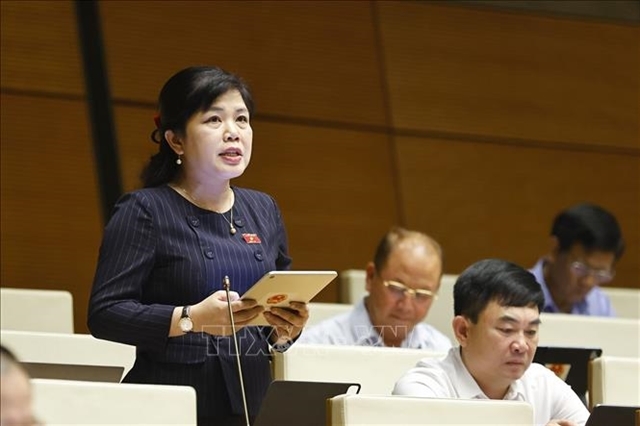Delegates said the revised law reflects the spirit of a knowledge-based and digital economy driven by innovation, contributing to realizing the Party and State’s goal that “science, technology and innovation are the top national policy.” However, they also emphasized that without proper oversight, risks could arise from the new provisions on technology-based capital contributions.
    |
 |
|
Deputy Nguyen Thi Thu Ha from Quang Ninh province voices her opinions. |
Deputy Nguyen Thi Thu Ha from Quang Ninh province noted that one of the new points in the draft law is allowing capital contributions in the form of technology. This could help unlock the “frozen” value of intellectual assets. Yet, she cautioned that allowing parties to self-determine the value of technology might lead to inflated valuations, creating “virtual capital,” and negatively impacting the investment environment.
She recommended that the drafting agency clarify the mechanism for self-determination of technology value and encourage the use of independent valuation services to avoid abuse and ensure transparency.
Other deputies agreed with the principle of granting ownership rights to organizations directly creating the technology, except for certain specific cases, as this helps remove long-standing bottlenecks in transfer of intellectual assets between research institutions and the market. However, they warned that the provision allowing parties to freely determine technology value could lead to transfer pricing or virtual capital creation if not properly stipulated.
Deputy Duong Khac Mai from Lam Dong province proposed supplementing the law with a post-implementation review mechanism and requiring independent valuation for high-value technology transactions. He also called for clearer legal responsibility for parties involved in inaccurate or fraudulent valuations.
He urged simplification of procedures for contributing capital through technology and suggested creating a “one-stop” system linking the Law on Technology Transfer, the Law on Enterprises, and the Law on Intellectual Property to facilitate faster commercialization of research results.
Regarding technology appraisal in investment projects, he noted that current procedures remain complex, involving multiple agencies and lengthy processing times. He proposed integrating technology appraisal with investment licensing and environmental impact assessment through an electronic one-stop mechanism to save time and reduce overlaps.
Deputies also supported adding a post-implementation review mechanism to ensure the law’s effective enforcement. They suggested that the Government develop detailed criteria and methods to evaluate the efficiency of technology transfers and delegate provincial-level authorities to assess projects using State funds, with regular reporting to the Ministry of Science and Technology for monitoring and oversight.
Deputy Hoang Van Cuong from Hanoi welcomed the draft law’s focus on encouraging technology transfer both from abroad and domestically but noted that provisions on outbound technology transfer remain vague. He recommended clarifying policies to promote two-way technology transfer, both inbound and outbound, while safeguarding key and core technologies developed by Vietnamese scientists.
He added that for new technologies such as artificial intelligence, semiconductors, and big data, there should be mechanisms to limit their transfer or require licensing before export, in order to protect competitive advantages and national secrets.
Source: VNA